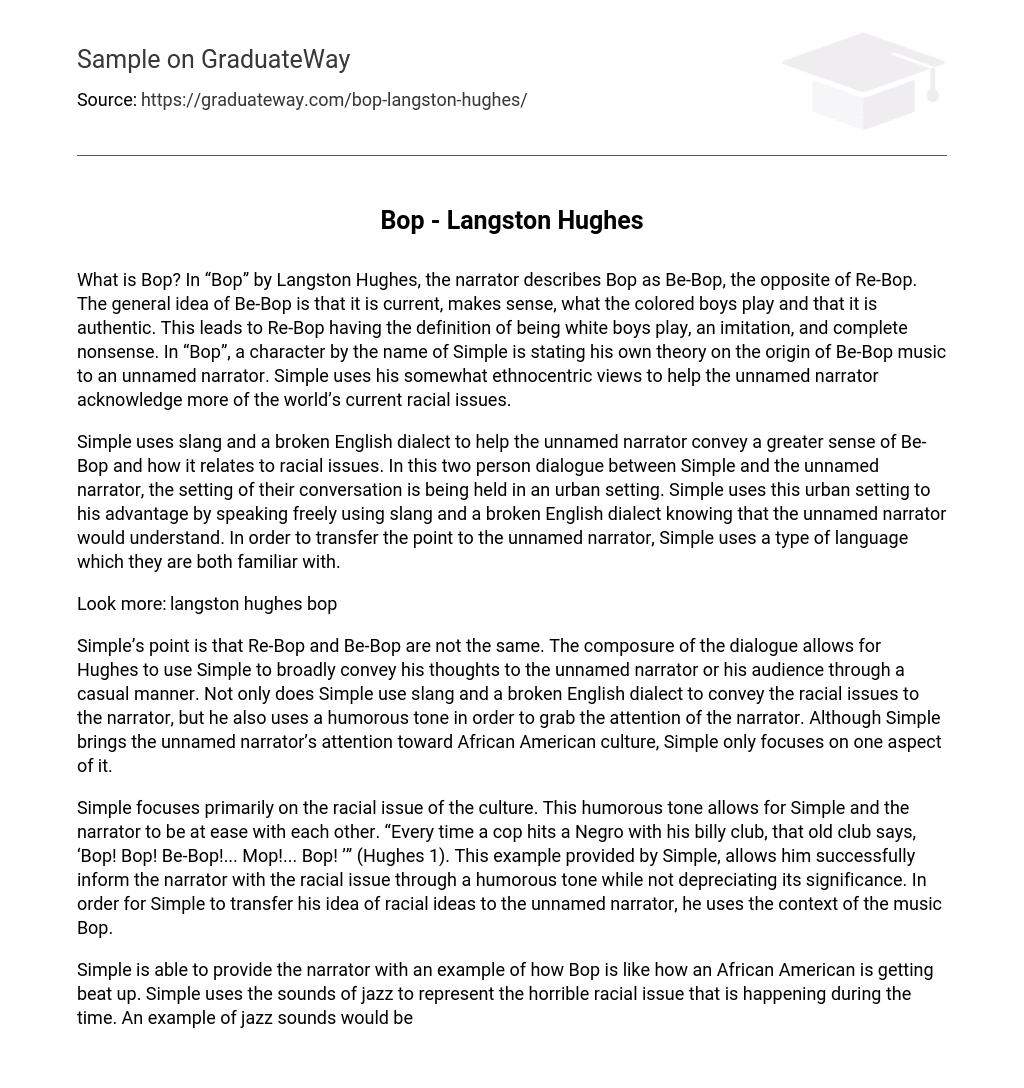What is Bop? In “Bop” by Langston Hughes, the narrator describes Bop as Be-Bop, the opposite of Re-Bop. The general idea of Be-Bop is that it is current, makes sense, what the colored boys play and that it is authentic. This leads to Re-Bop having the definition of being white boys play, an imitation, and complete nonsense. In “Bop”, a character by the name of Simple is stating his own theory on the origin of Be-Bop music to an unnamed narrator. Simple uses his somewhat ethnocentric views to help the unnamed narrator acknowledge more of the world’s current racial issues.
Simple uses slang and a broken English dialect to help the unnamed narrator convey a greater sense of Be-Bop and how it relates to racial issues. In this two person dialogue between Simple and the unnamed narrator, the setting of their conversation is being held in an urban setting. Simple uses this urban setting to his advantage by speaking freely using slang and a broken English dialect knowing that the unnamed narrator would understand. In order to transfer the point to the unnamed narrator, Simple uses a type of language which they are both familiar with.
Look more: langston hughes bop
Simple’s point is that Re-Bop and Be-Bop are not the same. The composure of the dialogue allows for Hughes to use Simple to broadly convey his thoughts to the unnamed narrator or his audience through a casual manner. Not only does Simple use slang and a broken English dialect to convey the racial issues to the narrator, but he also uses a humorous tone in order to grab the attention of the narrator. Although Simple brings the unnamed narrator’s attention toward African American culture, Simple only focuses on one aspect of it.
Simple focuses primarily on the racial issue of the culture. This humorous tone allows for Simple and the narrator to be at ease with each other. “Every time a cop hits a Negro with his billy club, that old club says, ‘Bop! Bop! Be-Bop!… Mop!… Bop! ’” (Hughes 1). This example provided by Simple, allows him successfully inform the narrator with the racial issue through a humorous tone while not depreciating its significance. In order for Simple to transfer his idea of racial ideas to the unnamed narrator, he uses the context of the music Bop.
Simple is able to provide the narrator with an example of how Bop is like how an African American is getting beat up. Simple uses the sounds of jazz to represent the horrible racial issue that is happening during the time. An example of jazz sounds would be “Old Cop just keeps on, ‘Mop! Mop!… Be-Bop! Mop! ’” (Hughes 1). Be-Bop represents the police brutality that the African Americans were facing at the time. All in all, Simple uses several techniques to help the unnamed narrator understand the racial issues. Hughes purposely did not mention the name of the narrator or his ethnicity for a reason. Somebody upstairs in Simple’s house had the combination turned up loud with an old Dizzy Gillespie record spinning like mad filling the Sabbath with Bop as I passed. ”(Hughes 1). Perhaps by starting off the story with someone unnamed, Hughes was trying to let the reader fill in the character and get their own understanding. The unnamed narrator may represent anyone who cannot relate to the blacks who have experienced the racial issue. That person may even be black if they were not discriminated against. This unnamed narrator may not appreciate Bop music because this person has not experienced the racism on African-Americans.





